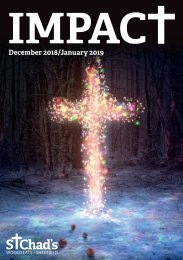2005-10
2005-10
2005-10
You also want an ePaper? Increase the reach of your titles
YUMPU automatically turns print PDFs into web optimized ePapers that Google loves.
was then that people realised that a<br />
good living could be made from ships<br />
wrecked because of the lack of warning<br />
lights, and they stole all the valuable<br />
cargo that was washed ashore. The<br />
business of "wrecking" became so<br />
lucrative that they began to erect false<br />
beacons in an effort to mislead sailors<br />
and ensure a shipwreck. At that time,<br />
anyone could build a lighthouse and<br />
collect fees at the nearest port, but<br />
because of both the cost and the<br />
difficulty involved in building such a<br />
structure, very few were built. There<br />
were only 34 in existence as late as<br />
1818. The earliest lighthouses had an<br />
open fire of wood and later, coal was<br />
burned. Then clusters of candles were<br />
used inside a glass lantern, but the light<br />
wasn't strong enough to be seen at a<br />
very great distance.<br />
In 1782 there was a<br />
new invention - the<br />
first circular oil-wick<br />
burner which was<br />
later improved by<br />
placing several wicks<br />
around the other.<br />
Next mirrors were<br />
used to intensify the<br />
power of the light<br />
and in 1822 a device<br />
was created using<br />
prisms which made even greater use of<br />
the available light. This idea was<br />
improved upon using a cage of prisms<br />
with the result that no light at all was<br />
wasted - these glass prism cages are<br />
called optics and are still used in most<br />
lighthouses today.<br />
Strangely enough, all these improvements<br />
made for the protection of ships<br />
at sea, actually introduced a new<br />
danger - for as soon as it was possible<br />
to see the beam of a lighthouse from<br />
many miles away, the possibility of<br />
mistaking one lighthouse for another<br />
became very real. This problem was<br />
solved by the invention of the group<br />
flashing system - the optic is made to<br />
revolve and give one, two or three<br />
flashes per revolution, thereby enabling<br />
each lighthouse to have its own code<br />
and so be identified beyond all doubt.<br />
Automation has now taken over and the<br />
first all-electric lighthouse operated by<br />
push-button has been built in the<br />
Phillipines. In England in 1836, an Act<br />
of Parliament was passed compelling<br />
all lighthouses to be bought from<br />
private owners by the Government, and<br />
the task of building and looking after all<br />
lighthouses was entrusted to Trinity<br />
House. Trinity House has been in<br />
existence since the Middle Ages as the<br />
Guild of Mariners, which was formed to<br />
help anyone connected with the sea. It<br />
looks after aged seamen and their<br />
widows, and issues all Thames pilot<br />
licenses, as well as maintaining all<br />
lightships, lightbuoys and lighthouses.<br />
It's interesting to note that many<br />
Christian groups include the term<br />
"beacon" or "lighthouse" in their name.<br />
Jesus, the Light of the World, brings<br />
hope and light into the lives of all who<br />
live in darkness and have literally lost<br />
their way, and he asks his followers to<br />
be shining examples of His Word.<br />
Perhaps it's not surprising that groups<br />
should choose such symbols for their<br />
names. Beacons were often lit, not<br />
just as signals to warn of danger but in<br />
times of celebration, too - indeed in<br />
recent times we have seen beacons lit<br />
to celebrate the Queen's Jubilee. So<br />
Christians want to celebrate and share<br />
the Good News, showing others the<br />
way to Jesus Christ.<br />
Chris Laude<br />
St Chads Church, 9 Linden Avenue, Woodseats<br />
email: office@stchads.org<br />
Tel: (0114) 274 5086 Page 9 web site: stchads.org


















